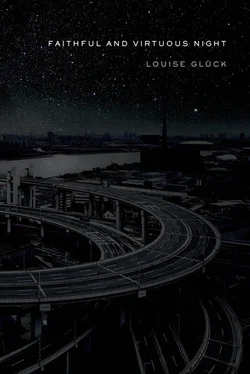1.
I was awakened this morning as usual
by the narrow bars of light coming through the blinds
so that my first thought was that the nature of light
was incompleteness—
I pictured the light as it existed before the blinds stopped it—
how thwarted it must be, like a mind
dulled by too many drugs.
2.
I soon found myself
at my narrow table; to my right,
the remains of a small meal.
Language was filling my head, wild exhilaration
alternated with profound despair—
But if the essence of time is change,
how can anything become nothing?
This was the question I asked myself.
3.
Long into the night I sat brooding at my table
until my head was so heavy and empty
I was compelled to lie down.
But I did not lie down. Instead, I rested my head on my arms
which I had crossed in front of me on the bare wood.
Like a fledgling in a nest, my head
lay on my arms.
It was the dry season.
I heard the clock tolling, three, then four—
I began at this point to pace the room
and shortly afterward the streets outside
whose turns and windings were familiar to me
from nights like this. Around and around I walked,
instinctively imitating the hands of the clock.
My shoes, when I looked down, were covered with dust.
By now the moon and stars had faded.
But the clock was still glowing in the church tower—
4.
Thus I returned home.
I stood a long time
on the stoop where the stairs ended,
refusing to unlock the door.
The sun was rising.
The air had become heavy,
not because it had greater substance
but because there was nothing left to breathe.
I closed my eyes.
I was torn between a structure of oppositions
and a narrative structure—
5.
The room was as I left it.
There was the bed in the corner.
There was the table under the window.
There was the light battering itself against the window
until I raised the blinds
at which point it was redistributed
as flickering among the shade trees.
1.
Several weeks ago I discovered a photograph of my mother
sitting in the sun, her face flushed as with achievement or triumph.
The sun was shining. The dogs
were sleeping at her feet where time was also sleeping,
calm and unmoving as in all photographs.
I wiped the dust from my mother’s face.
Indeed, dust covered everything; it seemed to me the persistent
haze of nostalgia that protects all relics of childhood.
In the background, an assortment of park furniture, trees, and shrubbery.
The sun moved lower in the sky, the shadows lengthened and darkened.
The more dust I removed, the more these shadows grew.
Summer arrived. The children
leaned over the rose border, their shadows
merging with the shadows of the roses.
A word came into my head, referring
to this shifting and changing, these erasures
that were now obvious—
it appeared, and as quickly vanished.
Was it blindness or darkness, peril, confusion?
Summer arrived, then autumn. The leaves turning,
the children bright spots in a mash of bronze and sienna.
2.
When I had recovered somewhat from these events,
I replaced the photograph as I had found it
between the pages of an ancient paperback,
many parts of which had been
annotated in the margins, sometimes in words but more often
in spirited questions and exclamations
meaning “I agree” or “I’m unsure, puzzled”—
The ink was faded. Here and there I couldn’t tell
what thoughts occurred to the reader
but through the blotches I could sense
urgency, as though tears had fallen.
I held the book awhile.
It was Death in Venice (in translation);
I had noted the page in case, as Freud believed,
nothing is an accident.
Thus the little photograph
was buried again, as the past is buried in the future.
In the margin there were two words,
linked by an arrow: “sterility” and, down the page, “oblivion”—
“And it seemed to him the pale and lovely
Summoner out there smiled at him and beckoned…”
3.
How quiet the garden is;
no breeze ruffles the Cornelian cherry.
Summer has come.
How quiet it is
now that life has triumphed. The rough
pillars of the sycamores
support the immobile
shelves of the foliage,
the lawn beneath
lush, iridescent—
And in the middle of the sky,
the immodest god.
Things are, he says. They are, they do not change;
response does not change.
How hushed it is, the stage
as well as the audience; it seems
breathing is an intrusion.
He must be very close,
the grass is shadowless.
How quiet it is, how silent,
like an afternoon in Pompeii.
4.
Mother died last night,
Mother who never dies.
Winter was in the air,
many months away
but in the air nevertheless.
It was the tenth of May.
Hyacinth and apple blossom
bloomed in the back garden.
We could hear
Maria singing songs from Czechoslovakia—
How alone I am —
songs of that kind.
How alone I am,
no mother, no father—
my brain seems so empty without them.
Aromas drifted out of the earth;
the dishes were in the sink,
rinsed but not stacked.
Under the full moon
Maria was folding the washing;
the stiff sheets became
dry white rectangles of moonlight.
How alone I am, but in music
my desolation is my rejoicing.
It was the tenth of May
as it had been the ninth, the eighth.
Mother slept in her bed,
her arms outstretched, her head
balanced between them.
5.
Beatrice took the children to the park in Cedarhurst.
The sun was shining. Airplanes
passed back and forth overhead, peaceful because the war was over.
It was the world of her imagination:
true and false were of no importance.
Freshly polished and glittering—
that was the world. Dust
had not yet erupted on the surface of things.
The planes passed back and forth, bound
for Rome and Paris — you couldn’t get there
unless you flew over the park. Everything
must pass through, nothing can stop—
The children held hands, leaning
to smell the roses.
They were five and seven.
Infinite, infinite — that
was her perception of time.
She sat on a bench, somewhat hidden by oak trees.
Far away, fear approached and departed;
from the train station came the sound it made.
The sky was pink and orange, older because the day was over.
There was no wind. The summer day
cast oak-shaped shadows on the green grass.
A man walks alone in the park and beside him a woman walks, also alone. How does one know? It is as though a line exists between them, like a line on a playing field. And yet, in a photograph they might appear a married couple, weary of each other and of the many winters they have endured together. At another time, they might be strangers about to meet by accident. She drops her book; stooping to pick it up, she touches, by accident, his hand and her heart springs open like a child’s music box. And out of the box comes a little ballerina made of wood. I have created this, the man thinks; though she can only whirl in place, still she is a dancer of some kind, not simply a block of wood. This must explain the puzzling music coming from the trees.












